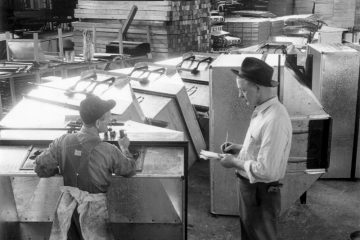Written By: Genevieve Hammang
Edited By: Adina Vega and Michelle Sosa

The ArQuives office in Toronto, Ontario
Queer history has often been considered dangerous by people in power. Consequently, archiving that history has also been a dangerous project. A famous example of suppression of queer knowledge and history in the modern era was the Nazi looting and burning of Berlin’s Institute of Sexology in 1933. As an academic institution devoted to advocacy for homosexual and transgender rights, it was an obvious target for the Nazis. It became an early example of how they would treat perceived enemies. Equally traumatic was the AIDS epidemic of the 1980s, which killed an entire generation of gay men and opened an enormous gap in the passing down of knowledge – one that the queer community still struggles with today.

Burning books from the Institute of Sexology
All this to say, the archiving and preservation of queer history is risky and difficult – but also extremely important. It is an undertaking with high stakes. And it is this context that makes the ArQuives such a remarkable project.
The ArQuives is an independent Canadian archive of queer or LGBTQ2+ history. At the time of this writing, it is the largest such archive in Canada and one of the largest independent LGBTQ2+ archives in the world. Initially created as part of The Body Politic newspaper collection in 1973, it was formally incorporated in 1980 and granted charitable status in 1981. It is dedicated to recovering and preserving queer history by acquiring, organizing, and providing public access to information made about, in, or by LGBTQ2+ people in Canada. It collects materials from all mediums, from books to personal papers to artifacts. The organization also maintains a research library, international research files, and periodicals.
Visitors can access ArQuives’ many exhibits either in person or online. The in-person office is in Toronto, Ontario, where ArQuives houses a wide array of vertical files. These include newspaper indices, other textual documentation, audiovisual recordings, music, posters, photos, artwork, buttons, matchbooks, t-shirts, and even board games.

Page 2 of Taking the Cake zine
For those unable to visit in person, the ArQuives offers extensive online resources in both English and French. Visitors can access many digital exhibits, including Coming Up Aces: Asexual Voices in the Archives, which features digitized issues of asexual spectrum zines; The Queer Home: Exploring Queer Architecture, Domesticity, and Gathering in Toronto, which explores the relationship between queerness and architecture; and the Anthony Mohamed Collection, which contains materials from the personal collection of an activist and equity worker in Toronto. Visitors can navigate these items by collection or individually. The ArQuives also provides educational resources for teachers looking to incorporate queer perspectives into English and history curricula for grades 9 through 12.
The ArQuives is an incredible resource for research into queer history, but it is important to keep in mind that it is not perfect. While now much more expansive in its focus, the ArQuives also acknowledges that it began as an archive for white gay liberation, and its collection consequently overrepresents that white, cis, and gay perspective. It is a critical reminder that the preservation of queer history is an ongoing project.
If you want to learn more queer history and about the remarkable efforts that have gone into keeping it alive, the ArQuives is an excellent place to start!



0 Comments